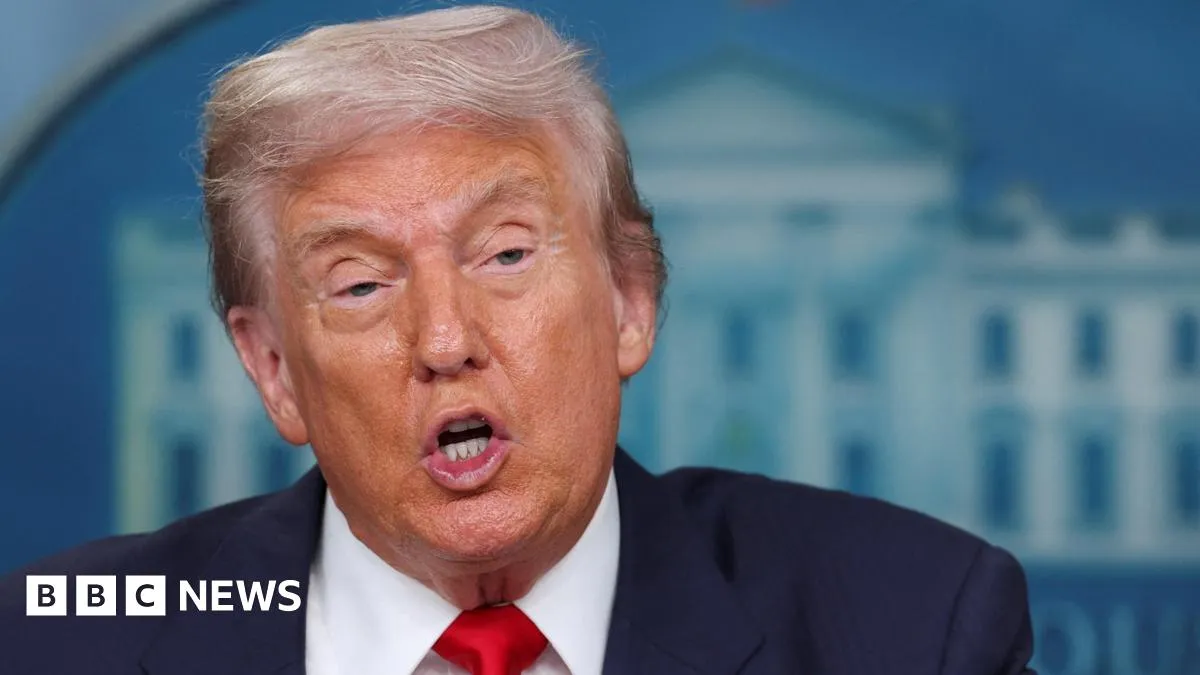
The White House has officially announced that former President Donald Trump will hold a virtual meeting tomorrow with Ukrainian President Volodymyr Zelensky and key European allies. This confirmation comes from CBS, a partner of the BBC, which also received confirmation from Zelensky's office. This critical call is scheduled to take place just before Trump's anticipated meeting with Russian President Vladimir Putin on Friday.
During a recent press briefing, the BBC's State Department correspondent, Tom Bateman, raised poignant questions regarding the tragic killing of Palestinian journalists on Sunday. Bateman characterized this incident as potentially the worst single attack on journalists in modern history. He highlighted the continued use of American weapons supplied to Israel in these conflicts, suggesting a connection to the deaths of journalists in Gaza.
In response, State Department spokesperson Bruce interrupted Bateman, cautioning against projecting such serious allegations without concrete evidence. Bateman countered by emphasizing that the majority of weapons used in the ongoing conflict have been supplied by the United States, raising significant accountability concerns. He inquired whether there had been any internal investigations to determine if the killings adhered to the rules of war.
While Bruce acknowledged the existence of internal processes, she refrained from disclosing further details, citing the sensitive nature of diplomatic relations. When pressed about this specific incident, Bruce reiterated the Trump administration's commitment to ending the conflict, without delving into specifics regarding the internal inquiries.
The conversation took a more serious turn when a reporter questioned Bruce about the recent targeted airstrike near Gaza City's al-Shifa Hospital, which resulted in the deaths of six journalists, including prominent Al Jazeera correspondent Anas al-Sharif. Israel's military claims they targeted Sharif for his alleged role as the head of a terrorist cell in Hamas, although they provided limited evidence to support this assertion.
Another reporter, expressing concern over the loss of colleagues, questioned Bruce's comfort with Israel's justifications for targeting journalists. Bruce responded by acknowledging the U.S. concern over innocent lives lost but stated that she could not comment on Israel's claims, directing inquiries back to Israeli officials. She emphasized that Secretary of State Marco Rubio is dedicated to finding a resolution to the ongoing conflict.
Bruce also noted that it was Vladimir Putin who first suggested the possibility of in-person discussions with Trump. She described the upcoming meeting as an opportunity for fact-finding and reiterated that Trump intends to reach out to Zelensky following his discussions with European leaders. Trump himself mentioned that after this week's talks, the outcome could lead to two possibilities: either wishing Ukraine "lots of luck" or negotiating a deal.
In a recent press conference, Trump described Friday's meeting with Putin as a "feel-out meeting." Press Secretary Karoline Leavitt characterized it as a "listening session," indicating that the White House is trying to manage expectations ahead of what could be a pivotal moment in U.S.-Russia relations. The conflict in Ukraine remains a complex issue, and while Trump may relay any Russian proposals to Zelensky, the likelihood of substantial progress remains uncertain.
European leaders have voiced strong concerns regarding Trump's suggestions that peace negotiations with Russia might involve territorial concessions from Ukraine. They emphasized that the principles of territorial integrity must be upheld and that national borders should not be altered by force. There are apprehensions that any formal recognition of changes to Ukraine's borders could lead to constitutional challenges and potential political instability for Zelensky's government.
In response to the discussions surrounding peace negotiations, President Zelensky has firmly reiterated that Ukraine will not concede any territory to Russia. Trump has suggested that any peace deal may involve territorial exchanges, specifically concerning the Donbas region and Crimea. However, Zelensky remains steadfast, warning that any withdrawal of Ukrainian forces could empower Russia to launch further attacks in the future.
During a recent press briefing, Leavitt was asked about the U.S. stance on Israel's intentions to occupy Gaza City. Despite previous discussions between Trump and Israeli Prime Minister Netanyahu, the White House has remained silent on this issue. Leavitt sidestepped the question, stating that the situation is complex and that the U.S. is flexible in offering resources to facilitate an end to the conflict. The White House's silence on this matter is expected to change, with Trump likely addressing it in the coming days.